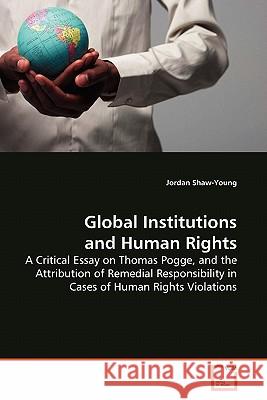Global Institutions and Human Rights » książka
Global Institutions and Human Rights
ISBN-13: 9783639143041 / Angielski / Miękka / 2009 / 84 str.
Thomas Pogge has famously argued that the present arrangement of international institutions that allows for human rights violations to occur on an ongoing basis is unjust, and further, that powerful states that create and maintain these institutions are responsible for the resulting human rights violations. Pogge concludes that this implication of responsibility creates a moral requirement for powerful nations to take immediate steps to reform the global institutional order in such a way as to minimize the number of foreseeable human rights violations that occur within it. I believe that Pogge is only partly correct in his analysis. In this book, I outline my argument that the global institutional order is not "unjust" as Pogge suggests. However, even if the maintenance of these institutions does not constitute an injustice, I conclude that that there remains an important sense in which powerful states that support the present arrangement of international institutions are responsible for ongoing subsistence rights violations, and thus have a strong moral responsibility to support institutional remedies for systematic human rights violations.
Thomas Pogge has famously argued that the presentarrangement of international institutions that allows for humanrights violations to occur on an ongoing basis is unjust, and further,that powerful states that create and maintain these institutionsare responsible for the resulting human rights violations. Poggeconcludes that this implication of responsibility creates a moralrequirement for powerful nations to take immediate steps to reformthe global institutional order in such a way as to minimize thenumber of foreseeable human rights violations that occur within it. I believe that Pogge is only partly correct in hisanalysis. In this book, I outline my argument that the globalinstitutional order is not "unjust" as Pogge suggests. However, even if themaintenance of these institutions does not constitute an injustice,I conclude that that there remains an important sense in whichpowerful states that support the present arrangement of internationalinstitutions are responsible for ongoing subsistence rightsviolations, and thus have a strong moral responsibility to supportinstitutional remedies for systematic human rights violations.











